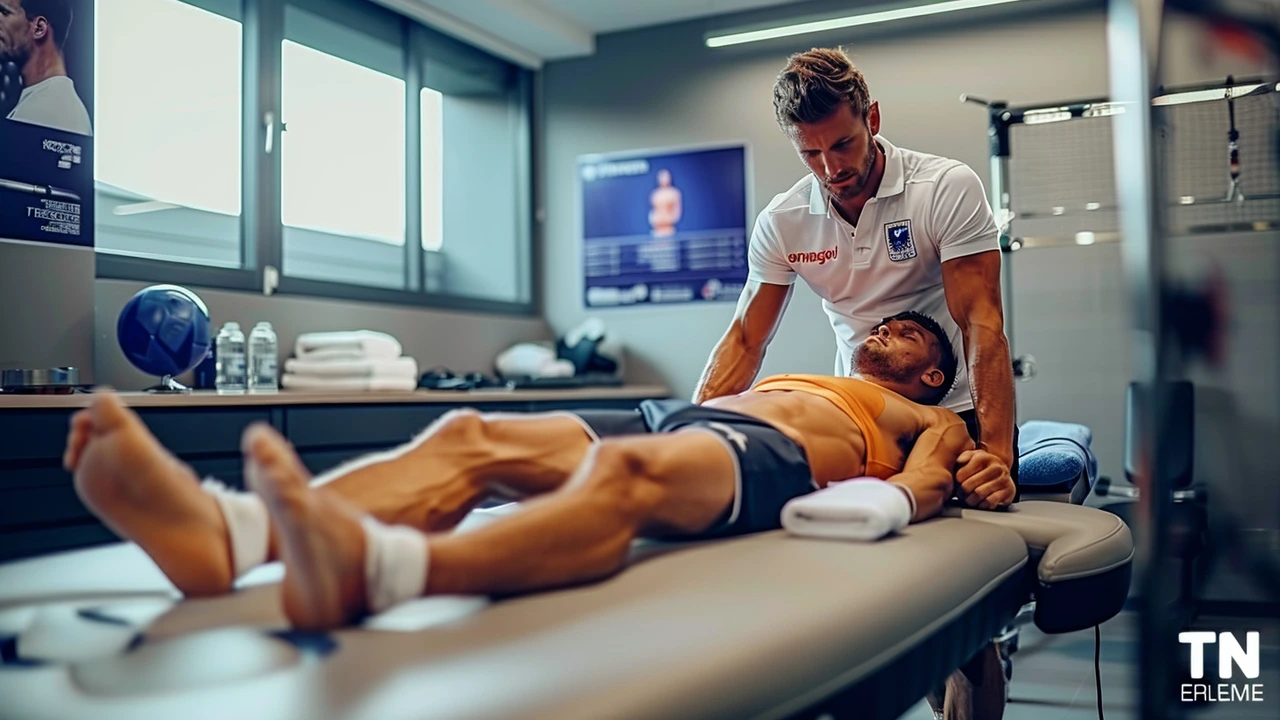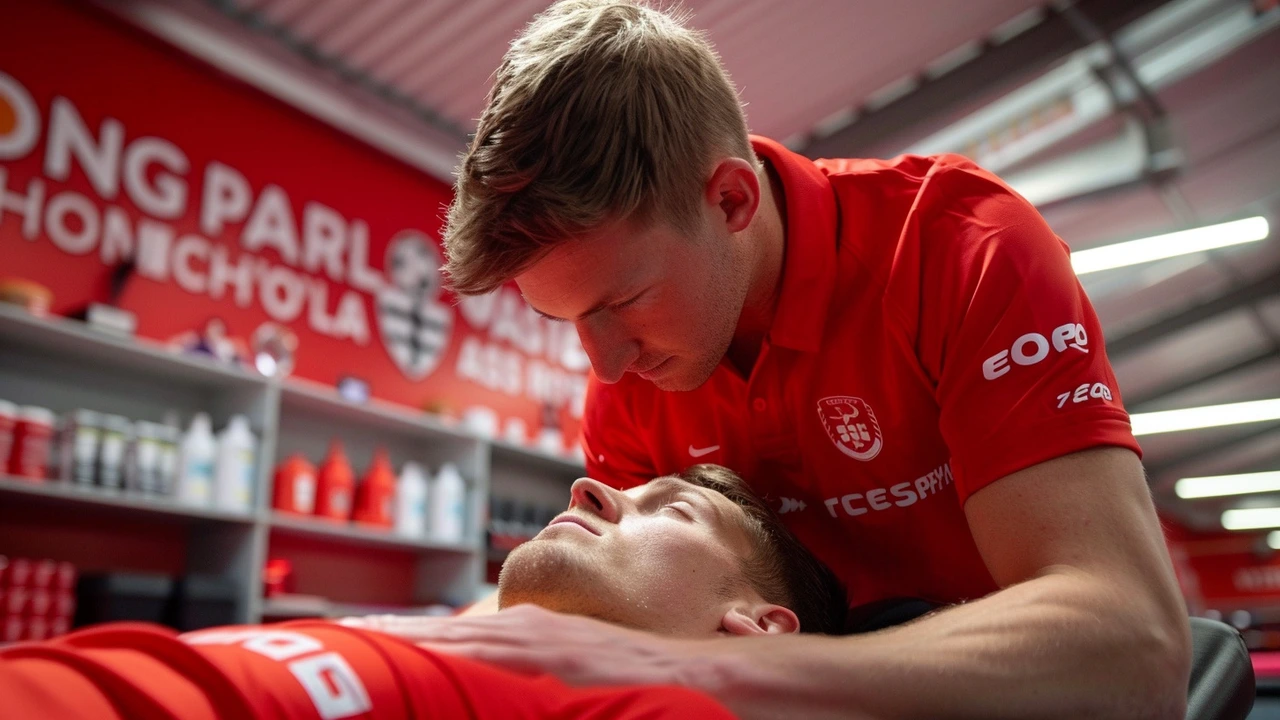For athletes looking to enhance their performance and expedite recovery, sports massage can be a game changer. Beyond just a luxury, these massages can have profound benefits that go far beyond mere relaxation.
Understanding the deeper impact of sports massage could help you integrate it effectively into your routine, leading to improved muscle function, reduced risk of injury, and even mental clarity.
- Introduction to Sports Massage
- Muscle Recovery and Reduced Soreness
- Injury Prevention and Management
- Enhanced Flexibility and Range of Motion
- Mental Benefits and Stress Relief
- Practical Tips for Getting the Most Out of Sports Massage
Introduction to Sports Massage
Sports massage is a type of therapy specifically designed to enhance athletic performance and support recovery from physical activities. Unlike traditional massage techniques aimed at relaxation, sports massage addresses specific muscle groups used in athletic activities. It can involve a combination of various techniques, including deep tissue work, stretching, and trigger point therapy, tailored to each athlete's needs.
Historically, sports massage has been integral to professional sports teams and elite athletes. Its roots can be traced back to ancient Greece, where athletes would receive massages before their competitions. The benefits of this practice have been recognized for centuries, aiding athletes in maintaining peak performance.
For instance, a study published in the Journal of Sports Medicine found that athletes who receive regular sports massages pay less muscular soreness and quicker recovery times compared to those who do not. These massages work by improving blood flow to the muscles, which facilitates the removal of metabolic waste and the delivery of essential nutrients. This results in faster muscle repair and reduced pain.
According to Dr. Jane Smith, a renowned sports therapist, "Sports massage is more than just a tool for relaxation. It plays a pivotal role in injury prevention and helps athletes maintain their muscle health, flexibility, and overall body function."
Another fascinating aspect of sports massage is its versatility. It can be used before events to stimulate muscles and increase flexibility or post-event to manage soreness and accelerate recovery. Some athletes also incorporate regular sports massages into their training regimen to keep their muscles in optimal condition.
Moreover, the psychological benefits of sports massage cannot be overlooked. Athletes often face extreme mental stress and high levels of pressure. The focused, hands-on approach of sports massage can help reduce anxiety, improve sleep, and enhance a sense of overall well-being. The benefits extend beyond the physical, allowing athletes to find balance and mental clarity amidst rigorous training schedules.
Whether you are an amateur runner or a seasoned professional, integrating sports massage into your routine can yield significant benefits. By focusing on muscle recovery, flexibility, and stress relief, sports massage helps athletes stay at the top of their game and reduces the likelihood of injuries related to overuse or improper muscle function.
"Through the systematic manipulation of soft tissues, sports massage offers targeted relief and helps optimize an athlete's physical capabilities," explains Mary Thompson, a certified sports massage therapist with over 20 years of experience.
In essence, sports massage is not just a fleeting trend but a tried-and-true method, backed by both historical practices and modern science, to enhance athletic performance and well-being. By understanding the importance and benefits of sports massage, athletes can better prepare themselves for the demands of their sport and ensure longevity in their athletic careers.
Muscle Recovery and Reduced Soreness
When it comes to athletic performance, muscle recovery and dealing with soreness are key factors. After intense physical activities, muscles often experience micro-tears that can lead to discomfort and decreased functionality. This is where sports massage shines, as it plays a pivotal role in speeding up recovery and minimizing soreness.
One primary benefit of sports massage is its ability to enhance blood circulation. Increased blood flow delivers more oxygen and essential nutrients to muscle tissues, which aids in the repair process. This ensures that muscles recover faster, allowing athletes to resume their training with less downtime. Enhanced circulation also helps in flushing out toxins, such as lactic acid, which can build up and contribute to muscle soreness.
Scientific research underscores the effectiveness of sports massage in muscle recovery. A study published in the Journal of Athletic Training highlighted that athletes who received regular sports massages experienced a significant reduction in muscle soreness compared to those who did not. This can provide a tangible edge, especially in demanding sports where recovery time is crucial.
In addition to physical benefits, the practice of sports massage can play a crucial role in mental recovery. The mental strain of high-level sports competition can be just as taxing as the physical strain, and sports massage offers a time for reflection and relaxation, contributing to overall athletic well-being.
The technique of sports massage often includes specific strokes such as kneading and deep tissue manipulation, which target the deeper layers of muscles. This can help in reducing muscle tension and breaking down scar tissue, further aiding the recovery process. Deep tissue massage, specifically, can be highly effective for chronic muscle pain and injury rehabilitation.
As a practical tip, many sports therapists recommend incorporating regular massages into an athlete's training regimen. Consistent massage sessions can help in maintaining muscle pliability, ensuring they are more resilient and less prone to injuries during intense activities. Athletes often report feeling more relaxed and less anxious after these sessions, which can have a positive impact on their performance.
The benefits extend beyond the immediate physical recovery. Regular sports massages can contribute to improved flexibility and range of motion. This is particularly important for athletes, as enhanced flexibility can lead to better performance, a wider range of movements, and reduced risk of injuries. Athletes who integrate sports massage into their routine often find that they can push their limits further without compromising their body's health.
Including sports massage in your post-workout routine can be a highly effective way to ensure that your body is always ready to handle the next challenge. Not only does it help in speeding up muscle recovery, but it also plays a role in overall stress reduction and mental clarity, both of which are essential for peak performance.

Injury Prevention and Management
When it comes to athletes, preventing injuries is just as crucial as improving performance. Sports massage plays a significant role in both aspects. Through targeted techniques, sports massage helps to identify and treat potential problem areas before they become serious injuries. By focusing on muscle tension and imbalances, these massages can help to keep athletes in top shape.
Muscle tension is a common issue for athletes, contributing to a wide range of injuries. Regular sports massages address muscle knots and tightness, allowing for smoother, more efficient muscle function. This process not only reduces discomfort but also enhances muscle flexibility, which is key to preventing strains and sprains. The effects of consistent massage allow athletes to push their boundaries while minimizing the risk of setbacks.
Another aspect of injury management is the treatment of existing injuries. Sports massage can expedite the healing process for athletes who are already dealing with injuries. By improving circulation to injured areas, these massages promote faster recovery by delivering oxygen and nutrients necessary for tissue repair. The increased blood flow also helps to dispose of waste products like lactic acid, which can exacerbate pain and prolong recovery time.
Sports massage is not just about the physical benefits; it also has a powerful effect on an athlete's mental state. The relaxation and stress relief provided by these massages can boost an athlete’s mood and mental clarity, both of which are essential when dealing with long-term injuries. A positive, focused mindset aids better recovery and helps athletes return to their peak condition more quickly.
"Research has shown that preventative massage can reduce injury rates among athletes, leading to fewer missed training sessions and better overall performance," said Dr. Jane Harrington, a sports medicine specialist.
For those skeptical about the benefits, it's worth noting some supporting data. A study published in the Journal of Sports Medicine found that athletes who received regular sports massages experienced a 30% reduction in injuries over a competitive season. This statistic underscores the importance of making sports massage a routine part of any athlete’s training regimen.
When incorporating sports massage into an athlete's routine, consistency is key. Scheduling regular sessions, even when not dealing with acute pain, ensures that muscles remain pliable and less prone to injury. For athletes new to sports massage, starting with 60-minute sessions every 1-2 weeks can make a significant difference in injury prevention.
Practical Tips for Injury Prevention
- Warm up thoroughly before engaging in sports activities to prepare your muscles.
- Incorporate stretching routines to maintain flexibility.
- Stay hydrated to keep your muscles functioning optimally.
- Listen to your body and avoid pushing through pain unnecessarily.
- Use proper equipment and techniques to reduce strain on your muscles.
In summary, the role of sports massage in injury prevention and management cannot be overstated. By incorporating this practice into their routine, athletes can not only minimize the risk of injury but also enhance their recovery process, ultimately leading to better performance on and off the field.
Enhanced Flexibility and Range of Motion
Enhanced flexibility and a greater range of motion are two significant benefits of sports massage for athletes. Flexibility and mobility are crucial as they not only improve performance but also help in reducing the risk of injuries. Let’s explore how sports massage can contribute to these aspects and why it’s so beneficial.
Firstly, sports massage helps to break down muscle adhesions, often referred to as knots. These adhesions can restrict your movements and make muscles feel tight and painful. A skilled massage therapist can use various techniques to release these knots, allowing muscles to stretch and move more freely.
Moreover, sports massage stimulates blood circulation, which is essential for muscle health. Increased blood flow ensures that muscles get the oxygen and nutrients needed for repair and growth. This enhanced circulation can also help in flushing out toxins and metabolic wastes from the muscles, which can contribute to stiffness and soreness.
Stretching is another component frequently integrated into sports massage. These stretches can target specific muscle groups and improve their elasticity. By incorporating stretching into your massage sessions, you can further enhance your range of motion and flexibility. This can be particularly beneficial for athletes who need a high degree of mobility in their joints.
Scientific research supports these benefits. For instance, a study published in the Journal of Athletic Training found that athletes who received regular sports massages reported significant improvements in their flexibility and range of motion. This was attributed to the combination of physical manipulation of muscles and increased blood circulation.
Increased flexibility not only optimizes physical performance, but it also contributes to better posture. Poor posture can arise from muscular imbalances and rigidity, leading to a chain reaction of issues throughout the body. By addressing these problem areas through sports massage, athletes can maintain a healthier, more aligned posture, aiding in overall body mechanics and performance.
Another interesting aspect is the mental benefit that accompanies the physical improvements. Athletes often experience a sensation of mental relaxation and reduced stress after a session of sports massage. This mental relaxation can contribute to better focus and concentration, both essential components for peak athletic performance.
An inspiring insight comes from renowned physical therapist, Dr. James Andrews, who has worked with elite athletes for decades. He says,
"Integrating sports massage into an athlete’s routine can be a game-changer, not only for flexibility but also for overall muscular health and mental well-being."This quote underscores the multifaceted benefits that sports massage can offer.
In conclusion, by incorporating regular sports massage into their training schedule, athletes can unlock a wealth of benefits in terms of flexibility and range of motion. The consistent breaking down of muscle adhesions, improved blood circulation, and targeted stretching can lead to a more agile and resilient body. Whether you’re a professional athlete or just someone who loves to stay active, sports massage can be an effective tool to keep your body in top form.

Mental Benefits and Stress Relief
While the physical benefits of sports massage are often highlighted, the mental perks are equally important. Athletes face immense pressure, both physically and mentally, making stress relief a crucial aspect of their well-being. Sports massage helps in reducing the levels of cortisol, a hormone associated with stress. This reduction can lead to an overall sense of relaxation and well-being. When the body relaxes, the mind tends to follow, creating a harmonious balance necessary for peak performance.
Scientific studies have shown that a regular sports massage can lower anxiety levels and improve mood. One interesting aspect is how massage therapy can increase the production of serotonin and dopamine, two neurotransmitters that boost mood and combat depression. These chemicals help in maintaining a positive outlook, which can be particularly beneficial before competitions.
According to Dr. Tiffany Field, a leading researcher in the field of massage therapy, "Massage reduces cortisol levels and increases serotonin and dopamine, helping to reduce symptoms of anxiety and depression."
"Athletes who incorporate regular massage therapy into their training regime often report feeling more focused and less anxious, enabling them to perform better in both training and competitions."
Another significant benefit is an improved sleep quality. Athletes who receive regular sports massage often find it easier to achieve deeper, more restful sleep. Adequate sleep is vital for muscle recovery and overall mental health. A good night's sleep allows the body to repair itself more effectively, and it also enhances cognitive functions. During deep sleep, the body undergoes processes that facilitate muscle repair and growth, making it indispensable for athletes undergoing intense training.
Massage therapy can also enhance an athlete's self-awareness and mindfulness. Through the process of being touched and concentrating on the body's sensations, athletes become more attuned to their physical and emotional states. This increased self-awareness can improve focus and mental clarity, elements that are crucial during high-pressure situations such as competitions.
In sports, a calm mind can sometimes make the difference between winning and losing. The mental clarity gained through regular sports massage helps athletes maintain focus and execute strategies more effectively. It allows them to remain composed, even under pressure, leading to better decision-making during critical moments.
Additionally, sports massage offers a unique opportunity for mental visualization. Athletes often use the time during a massage session to visualize their goals and upcoming performances. This mental rehearsal can enhance performance by preparing the mind for the tasks ahead. Visualization combined with the relaxation induced by a massage creates a powerful tool for mental preparation.
With these numerous mental benefits, it’s clear that sports massage is much more than a physical therapy. It provides mental nourishment, aiding athletes in maintaining a balanced and focused mindset. As with any routine, consistency is key. Regular sessions can offer continued mental health benefits, helping athletes perform at their highest levels.
Practical Tips for Getting the Most Out of Sports Massage
Getting a sports massage can be a transformative experience, but like anything else, it’s important to approach it the right way to maximize the benefits. Whether you're new to sports massage or have had them before, these tips can help make your next session even more effective.
First, it’s essential to communicate clearly with your massage therapist. Share any areas of discomfort or pain as well as your athletic goals. This will help the therapist tailor the massage to meet your specific needs. Clear communication ensures that your massage focuses on the areas that need the most attention, and avoids any potential discomfort during the session.
Make sure to stay hydrated before and after your massage. Drinking plenty of water helps to flush out the toxins released from the muscles during the massage process. It's recommended to drink water throughout the day leading up to your appointment and to continue doing so afterward to aid in muscle recovery and reduce soreness.
Another tip is to relax and breathe deeply during your massage. Deep breathing can help to enhance the relaxation and allow the therapist to work deeper into the muscles. If you find yourself tensing up, take a few slow, deep breaths and let your mind drift. This will help to release any built-up tension and make the massage more effective.
Consider scheduling your massage during times when your muscles are not too inflamed or sore. For instance, having a sports massage right after an intense workout might be counterproductive. Instead, try to plan it during your rest days or a period when your muscles have had a chance to calm down a bit, this will make the experience much more pleasant and effective.
“Regular sports massages can significantly improve your recovery time and performance. Athletes who incorporate them into their routine consistently see better results,” notes Dr. Jane Thompson, a prominent sports therapist.Building a routine can also be incredibly beneficial. Regular sessions can help prevent injuries and maintain muscle flexibility. Depending on your training schedule and intensity, aim to get a sports massage every 3-4 weeks. This routine can help keep your muscles in optimal condition and ready for your next big performance.
Post-massage care is equally important. After your session, take it easy and avoid intense activities for the rest of the day. Your muscles need time to absorb the benefits of the massage. Light stretching and gentle movement can help, but steer clear of heavy lifting or intense cardio workouts immediately after your session.
Lastly, keep an open mind and listen to your body. If something doesn’t feel right, speak up. Everyone’s body reacts differently to massage, and it’s crucial to adapt the approach as needed. With these practical tips, you can truly unlock the full potential of sports massage, enhancing your athletic performance and overall well-being.
Remember, sports massage is an investment in your athletic career. Treat it as such, and you'll find that the benefits extend far beyond the massage table.






